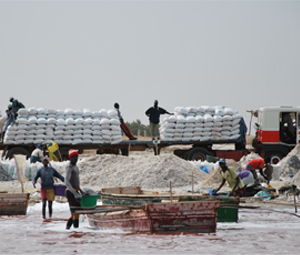News
Nutrition International highlights Canada-Africa partnership to advance nutrition, health and education goals
November 18, 2024
WP_Term Object
(
[term_id] => 49
[name] => Field Stories
[slug] => all-field-stories
[term_group] => 0
[term_taxonomy_id] => 49
[taxonomy] => news-category
[description] => Discover the personal stories of people whose lives have been impacted by better nutrition, and those working tirelessly to deliver it.
[parent] => 0
[count] => 180
[filter] => raw
)
Harmonizing salt iodization levels in West Africa
In order to facilitate the regional trade and distribution of iodized salt, MI teamed up with UNICEF to engage the UEMOA Commission in harmonizing the salt iodization levels among its countries.
Posted on January 28, 2013


Salt iodization has been mandatory in all eight countries of the Union Economique et Monétaire Ouest Africaine (UEMOA) for ten years, but no single country has achieved the target of more than 90 per cent of households consuming adequately iodized salt.
Disparity among countries as to what constitutes acceptable iodization levels in salt was identified by MI and UNICEF as one of the bottlenecks limiting appropriate coverage.
Levels that are acceptable in some exporting countries have been unacceptable in certain importing countries. This has significantly restricted the availability of iodized salt in a region with a high prevalence of iodine deficiency disorders.
In order to facilitate the regional trade and distribution of iodized salt, MI teamed up with UNICEF to engage the UEMOA Commission in harmonizing the salt iodization levels among its countries.
After a UEMOA workshop in 2010, MI and UNICEF commissioned an international salt iodization expert to help the Commission harmonize the salt iodization levels in the eight UEMOA countries, taking into account the World Health Organization guidelines and the regional context.
A single, regional salt iodization level norm for all UEMOA countries has been determined, and MI and UNICEF are now advocating for endorsement of this norm by the Commission body and individual member states.
This will fold into efforts to secure adoption of this norm by the wider Economic Community of West African States (ECOWAS) region of 15 countries, which includes the eight UEMOA states.